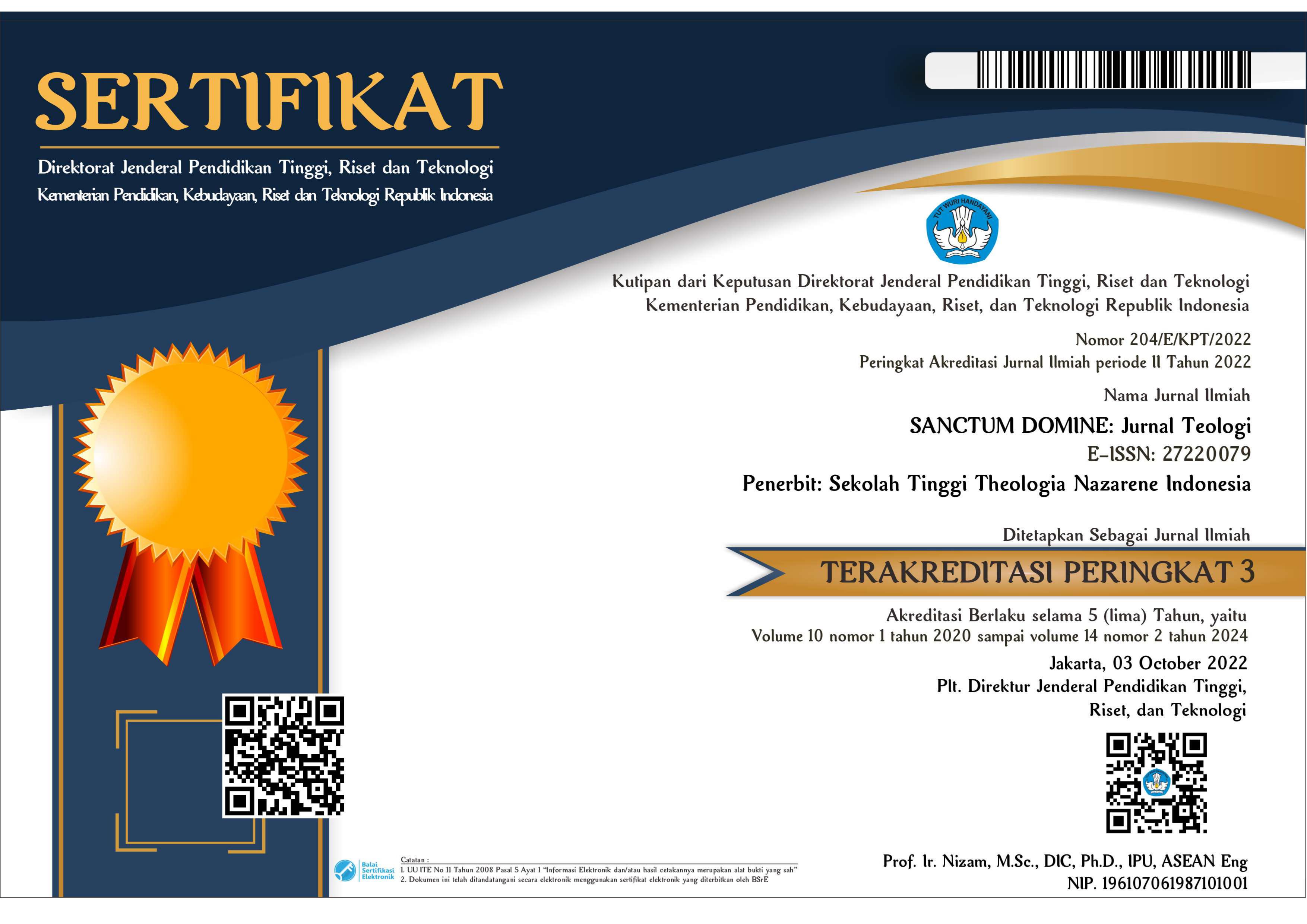God the Household Manager
Reinterpretation of Genesis 1:1-31 Through the Lens of Functional and Domestic Roles of Women
Abstract
As modern people, Christians often come to the book of Genesis, especially regarding the events of creation, with a scientific lens to seek answers to objections such as creation ex nihilo, regarding the age of the earth, as well as material things. John H. Walton proposed reading the creation story through a functional lens (creating order) rather than a material one. The researcher was then interested in seeing God as the ruler of the household through Walton's thoughts regarding women, especially housewives who are often seen as inferior to men who work or produce something. This paper uses a qualitative approach with data collection methods in the form of literature studies, especially regarding Walton's thoughts. The results of this research show that even on the first page of the book of Genesis, God has introduced himself as the God who brings order, the God who provides functions, and the God who regulates households which is also resonant with the function of housewives who are often discriminated against.
References
Biggs, Andrew. “Gender Pay Gap Solution: Ban Stay-at-Home Moms.” Forbes. Last modified 2016. Accessed September 22, 2023. https://www.forbes.com/sites/andrewbiggs/2016/04/13/gender-pay-gap-solution-ban-stay-at-home-moms/.
Christian, Imanuel. “STUDI LITERATUR PENCIPTAAN TIMUR DEKAT KUNO.” Jurnal Teologi Pengarah 1, no. 2 (August 2, 2019): 121–128.
Cox, Gavin. “Egypt’s Hieroglyphs Contain a Cultural Memory of Creation and Noah’s Flood.” Proceedings of the International Conference on Creationism 7, no. 1 (2013). https://digitalcommons.cedarville.edu/icc_proceedings/vol7/iss1/36.
Davidson, Richard, and Randall Younker. “The Myth of the Solid Heavenly Dome: Another Look at the Hebrew רָקִיעַ (Rāqîaʿ).” Faculty Publications (January 1, 2015): 31–56.
ETCSL Project. “The Exploits of Ninurta: Translation.” Last modified 2016. Accessed September 23, 2023. https://etcsl.orinst.ox.ac.uk/section1/tr162.htm.
Foster, Benjamin. Before The Muses: An Anthology Of Akkadian Literature. 3rd ed. Maryland: University Press of Maryland, 2005.
Gadalla, Moustafa. Egyptian Cosmology: The Animated Universe. Greensboro, NC: Tehuti Research Foundation, 2017.
Henry, Matthew. An Exposition of the Old and New Testament. Vol. 9. London, England, United Kingdom: Forgotten Books, 2018.
Innayah, Maulida Nurul, and Bima Cinintya Pratama. “TANTANGAN DAN KESEMPATAN WANITA DALAM LINGKUNGAN KERJA.” Derivatif : Jurnal Manajemen 13, no. 2 (December 6, 2019). Accessed September 22, 2023. https://fe.ummetro.ac.id/ejournal/index.php/JM/article/view/393.
Johnson, Emma. “How Stay-at-Home Moms Hurt Gender Equality.” Linkedin.Com. Last modified 2018. Accessed September 22, 2023. https://www.linkedin.com/pulse/how-stay-at-home-moms-hurt-gender-equality-emma-johnson.
Kriswanto, Agus. “Tohu Wabohu dan Creatio ex Nihilo: Tafsir Kejadian 1:1-2 Sebagai Perspektif Memahami Realitas Anomali.” Mitra Sriwijaya: Jurnal Teologi dan Pendidikan Kristen 1, no. 1 (July 9, 2020). Accessed September 13, 2023. http://sttsriwijaya.ac.id/e-journal/index.php/mitra_sriwijaya/article/view/6.
Landrum, Sarah. “More Millennial Women Are Becoming Stay-At-Home Moms -- Here’s Why.” Forbes. Last modified 2018. Accessed September 22, 2023. https://www.forbes.com/sites/sarahlandrum/2018/02/09/more-millennial-women-are-becoming-stay-at-home-moms-heres-why/.
Lichtheim, Miriam. Ancient Egyptian Literature, Volume III: The Late Period. Oakland, California: University of California Press, 2006.
Linscomb, Dennis. “The Ancient Near Eastern Context of the Genesis Creation and Flood Stories and Its Impact on Biblical Inspiration” (2016). Accessed September 23, 2023. https://www.academia.edu/20019677/The_Ancient_Near_Eastern_Context_of_the_Genesis_Creation_and_Flood_Stories_and_Its_Impact_on_Biblical_Inspiration.
Moș, Grigore-Dinu. “‘TOHU WABOHU’ IN GENESIS 1, 2. KABBALISTIC, PATRISTIC AND MODERN EXEGESIS.” Studia Universitatis Babeș-Bolyai Theologia Orthodoxa (December 30, 2017): 5–20.
Nazneen, Sohela, and Awino Okech. “Introduction: Feminist Protests and Politics in a World in Crisis.” Gender & Development 29, no. 2–3 (September 2, 2021): 231–252.
Nomaguchi, Kei, and Melissa A. Milkie. “Parenthood and Well-Being: A Decade in Review.” Journal of Marriage and Family 82, no. 1 (2020): 198–223.
Pasternak, Anna. “Fast Track to Femininity: Why Competing with Men Has Left Women out of Touch with Their Feminine Side.” Mail Online. Last modified 2008. Accessed September 22, 2023. https://www.dailymail.co.uk/femail/article-1039030/Fast-track-femininity-Why-competing-men-left-women-touch-feminine-side.html.
Putri, Ketut Ariyani Kartika, and Hilda Sudhana. “Perbedaan Tingkat Stres Pada Ibu Rumah Tangga Yang Menggunakan Dan Tidak Menggunakan Pembantu Rumah Tangga.” Jurnal Psikologi Udayana 1, no. 1 (October 1, 2013). Accessed September 23, 2023. https://ojs.unud.ac.id/index.php/psikologi/article/view/25052.
Putthoff, Tyson L. Gods and Humans in the Ancient Near East. Cambridge, United Kingdom ; New York, NY, USA: Cambridge University Press, 2020.
Rigoglioso, Marguerite. “Researchers: How Women Can Succeed in the Workplace.” Stanford Graduate School of Business. Last modified 2011. Accessed September 22, 2023. https://www.gsb.stanford.edu/insights/researchers-how-women-can-succeed-workplace.
Siraz, Lamiya. “Men Women Should Be Celebrated Equally.” The Times of India, 2019. Accessed September 22, 2023. https://timesofindia.indiatimes.com/readersblog/lamiyasiraj/men-women-should-be-celebrated-equally-2070/.
Sirgy, M. Joseph, Grace B. Yu, Dong-Jin Lee, Mohsen Joshanloo, Michael Bosnjak, Jinfeng Jiao, Ahmet Ekici, Eda Gurel Atay, and Stephan Grzeskowiak. “The Dual Model of Materialism: Success Versus Happiness Materialism on Present and Future Life Satisfaction.” Applied Research in Quality of Life 16, no. 1 (February 1, 2021): 201–220.
Smoot, Stephen. “Council, Chaos, and Creation in the Book of Abraham.” Journal of Book of Mormon Studies 22, no. 2 (January 1, 2013). https://scholarsarchive.byu.edu/jbms/vol22/iss2/4.
Stephany, Timothy J. Enuma Elish: The Babylonian Creation Epic: Also Includes “Atrahasis”, the First Great Flood Myth. First Edition. CreateSpace Independent Publishing Platform, 2013.
Sweeney, James. “Winebrenner Theological Seminary.” Winebrenner Theological Seminary, March 18, 2019. Accessed October 21, 2023.
Toczek, Lisa, Hans Bosma, and Richard Peter. “The Gender Pay Gap: Income Inequality Over Life Course – A Multilevel Analysis.” Frontiers in Sociology 6 (2021). Accessed September 22, 2023. https://www.frontiersin.org/articles/10.3389/fsoc.2021.815376.
Walton, John H. Genesis: The NIV Application Commentary. The NIV Application Commentary. Grand Rapids, Michigan: Zondervan, 2014.
———. The Lost World of Genesis One: Ancient Cosmology and the Origins Debate. Vol. Volume 2. The Lost World Series. Westmont, Illinois: IVP Academic, 2009.
Wibowo, Guntur Arie, Chairuddin Chairuddin, Aulia Rahman, and Riyadi Riyadi. “Kesetaraan Gender: Sebuah Tijauan Teori Feminisme.” SEUNEUBOK LADA: Jurnal ilmu-ilmu Sejarah, Sosial, Budaya dan Kependidikan 9, no. 2 (October 12, 2022): 121–127.
Witzel, Michael. “Water in Mythology.” Daedalus: Journal of the American Academy of Arts & Sciences. On Water (2015).
Copyright (c) 2023 SANCTUM DOMINE: JURNAL TEOLOGI

This work is licensed under a Creative Commons Attribution-NonCommercial-ShareAlike 4.0 International License.
Copyright:
SANCTUM DOMINE: Jurnal Teologi will validate, produce, disseminate, and act as steward in the long-term curation of every article published. In order to achieve this, the author typically requires a transfer or “assignment” of the copyright in the article. As is the case for open access publishing, the author (or copyright owner of the article, if different) signs an author publishing agreement. The agreement incorporates the necessary transfer of copyright.
After assigning copyright, the author will still retain the right to:
- Be credited as the author of the article.
- Own and exercise any trademark or patent rights held by author and addressed in the article.
- Make printed copies of the article to use for a lecture or class that the author leading on a non-commercial basis.
- Share the article with friends, colleagues and influential people the author would like to read the work.
- Present the article at a meeting or conference and distribute printed copies of the article on a non-commercial basis.
License:
This work is licensed under a Creative Commons Attribution-NonCommercial-ShareAlike 4.0 International License.
You are free to:
- Share — copy and redistribute the material in any medium or format
- Adapt — remix, transform, and build upon the material
- The licensor cannot revoke these freedoms as long as you follow the license terms.
Under the following terms:
- Attribution — You must give appropriate credit , provide a link to the license, and indicate if changes were made . You may do so in any reasonable manner, but not in any way that suggests the licensor endorses you or your use.
- NonCommercial — You may not use the material for commercial purposes .
- ShareAlike — If you remix, transform, or build upon the material, you must distribute your contributions under the same license as the original.
- No additional restrictions — You may not apply legal terms or technological measures that legally restrict others from doing anything the license permits.
Notices:
You do not have to comply with the license for elements of the material in the public domain or where your use is permitted by an applicable exception or limitation .
No warranties are given. The license may not give you all of the permissions necessary for your intended use. For example, other rights such as publicity, privacy, or moral rights may limit how you use the material.



8.png)









